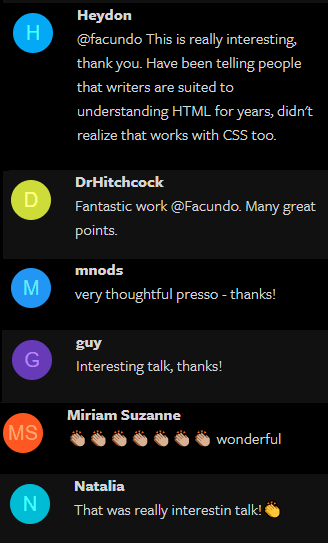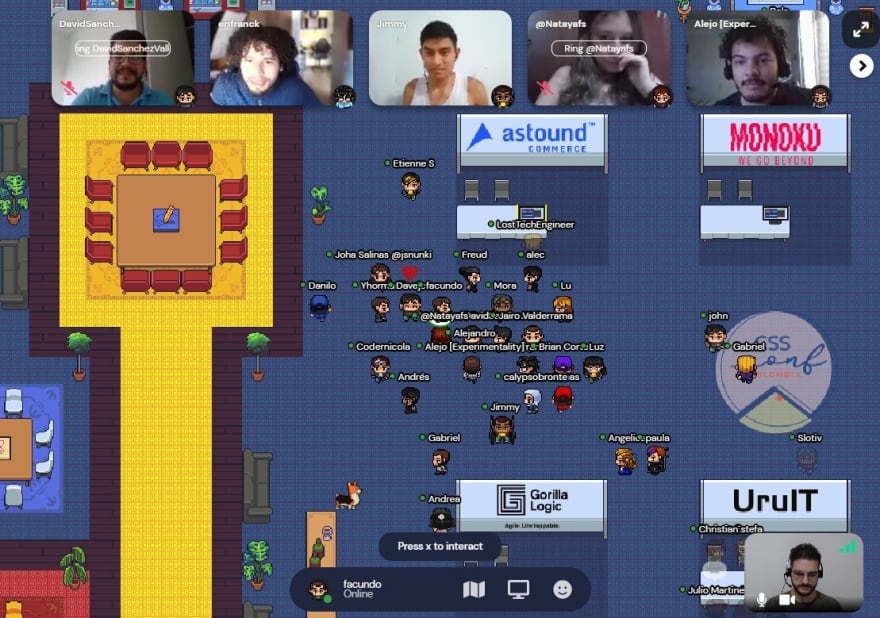18
The Amazing Experience of Speaking at Online Events
In my previous article I shared the joy of finally having some of my talks selected for conferences, one of my goals for the current (and the past) year.
But being online instead of in-person, this was a particularly challenging experience. Here's what I learned speaking at some of the world's best frontend conferences
I had everything set up for a traditional, slides-driven approach for my CSS Conf Co talk.. and then I had the brilliant idea of switching to a no-slides, live-coding one.
And I mean it. Just one week before the event, I decided to ditch the slides and just use CodePen instead, live coding the seven CSS tricks for that talk.
That proved to be one of the best, worst ideas I've ever had. It transformed an already thrilling event into skydiving experience.
If you ever went skydiving, you know exactly what I'm talking about: you always wanted to do it, so one day you get the reservation, go to the airfield, set yourself up, board the plane... your excitement growing with every step... But the precise instant before jumping, you regret every decision in your life that got you there. But hey, you decide to jump anyway, and the moment that you touch the ground, you want to do it again.
Well, live coding the whole lightning talk was exactly like that. Increased excitement, a moment of why the hell did I got myself into this?, a thrilling ride, and the realisation that I can't wait to do it all again
Sure thing, I forgot some of the things I wanted to say. I got a rough start with weird phrasing as the adrenaline was over nine thousand. Still, 6 out of the 7 examples went without any issue, while the other failed due to a typo.. that I saved with plan b: commented, working code that I had at previously setup just off-screen.
Funny enough, adrenaline totally messes up your perception of time. When I got stuck on that typo I felt like it was at least two minutes of people looking at my confused face. Re-watching the recording, turned out it was under 10 seconds.
A thrilling experience that I can't wait to repeat, and would recommend to anyone. Just don't change your approach one week before the event.
Web Directions' approach to online events was completely different: they set three runtimes for different time zones, so people in the Pacific, Europe, and the Americas can all watch it at decent hours. This obviously meant that the talks were pre-recorded, which gives us the opportunity to make it perfect. But if you have any experience with anything in life, you'd know that perfect is the enemy of... done.
That didn't stopped me from trying. I felt that with all the help they provided (including a great camera, lights, mic... a professional setup) I owned nothing short of perfection.
And it was a struggle. I put an absurd level of effort on my pronunciation, which meant three days of recording sessions. In the last one, I decided to split the talk in eight separate blocks, so I can repeat just that part if anything was sub-par.
But that wasn't enough. Some parts took 8 or 9 takes. Still, the editor was able to work some magic and edit it all together, for a definitely not-perfect, great talk, if I can say so myself.
Anyway, the lesson here is... don't obsess over hiding your accent if you (as I) are not a native English speaker. It's much easier and more enjoyable if you just let yourself flow. That's definitely my plan for the next one.
One aspect that I loved about my experience at Web Directions was the audience interaction in the chat. My talk greatly relied on it, with the more impactful bits pretty much depending on a "raise your hands" moment... so I took a gamble and decided to incentivize audience interaction anyway. I did it in the recording, but also in the live chat during the three broadcast of the event.
And the results were amazing. When speaking at live, in-person events, I (as almost all speakers) greatly rely on audience interaction. Even if your talk doesn't have deliberately interactive moments, there are cues that tell you when you're connecting with the audience, from applause and burst of laughter (hopefully when you're trying to make a joke), to that connection of looking at random attendees in the eyes for a brief moment.
You obviously don't have that at pre-recorded events, so you can't adjust in the moment as you hopefully would live, but people are still there to support you. They interact more freely when you ask for it (instead of counting raised hands, you get deeper, longer and more personalized answers), they still provide confirmation when you're reaching them with short messages and emoticons, they take notes and tweet about it. And they're super welcoming and make sure to thank you and join the virtual applause at the end.
Here's some of the feedback I gathered throughout the talk:

Incredibly heartwarming comments from the attendees, including some of the people I admire the most and who inspired me to write this talk in the first place.. there are no words to describe how great this makes me feel
I still got to meet and work with awesome people, even some that I've admired for years, grow my network, and share with the community.
The live nature of the CSS Conf talk meant I couldn't pay the tinniest bit of attention to the live chat (otherwise, I would have resolved that typo sooner, as people were already pointing it out), but we got an amazing after-party in a virtual conference room via gather.town, where we got to meet the attendees and sponsors, play games, share stories... all that good stuff you'd expect from in-person conferences.

And the best part, the day before the event we got a lunch / dinner ('cause Americas / Europe time zones) where we got to meet the other speakers and organizers, some of which have become great friends since.
I thoroughly enjoyed every last bit about speaking at online events so far, an I'm thrilled to announce I'm already selected for a couple more. Hopefully one of them is gonna be in-person, if the situation with COVID allows for.
But if there's something to learn from this experience (and this post), is that online conferences are equally valid and enjoyable. Just like with remote work, I believe some of these conferences are keeping the online or hybrid format, and that's a good thing. It reduces the cost for everyone without affecting the value, broadens the geographical reach, and makes it easier to assemble a diverse lineup (something both CSSConfCo as Web Directions' Hover stood out for)
So make ready and consider sending your proposals for online conferences too. I'd recommend them 100%!
18
